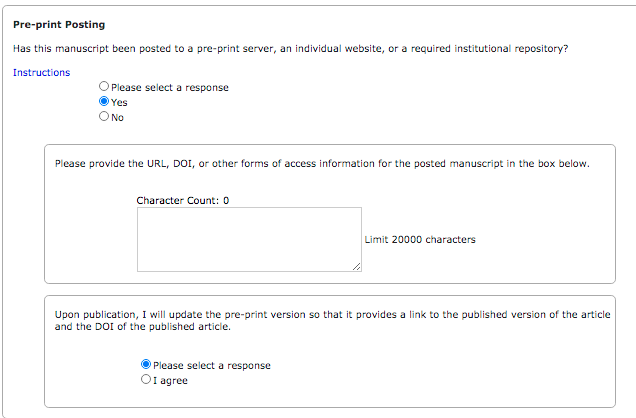We’re happy to announce that ASHA Journals now welcome submission of manuscripts that have been released as preprints on a preprint server, individual website, or a required institutional repository.
What Is a Preprint?
A preprint is any “complete written description of a body of scientific work that has yet to be published in a journal” (Bourne et al., 2017). This can include data, poster presentations, or even completed manuscripts that haven’t been submitted for peer review.
Releasing such works as preprints before they have undergone peer review is increasingly popular. In fact, some labs and funders ask their authors to submit manuscripts to a preprint server once they have been completed. Researchers looking to post an article on their CV can also refer interested parties to the preprint ahead of time.
Preprints are free to post and read, making them an effective way for researchers to quickly post their findings. Although preprints are the fastest way to distribute data and get feedback, they are not peer reviewed. Often, though, there is significant enough value in the preprint itself to warrant attention of fellow researchers and others. This has been particularly evident in recent public health research, such as that related to COVID-19. In fact, recognizing the value of such work, NIH is now doing a preprint pilot to include discoverability of that research via PubMed and PubMed Central.
As the number of preprint servers has grown in recent years, and as the range of disciplines served by them has expanded, ASHA Journals has monitored the landscape and determined that the works released as preprints should no longer be ineligible for submission. The necessary steps for the submission of preprints have now been taken, as noted below.
Four Easy Steps!
If you’re uploading a manuscript has previously appeared as a preprint, you can do so in four easy steps.
- Answer “yes” to the “Preprint posting” when uploading it to Editorial Manager.
- Provide the URL, DOI¹, or another way to access the preprint.
- Click the box to note your agreement to update the preprint with a link and the DOI of the article if it is accepted by and published in an ASHA journal.
- Upon publication of your article, you’ll receive a link to it, which also includes the DOI. Simply add both to your preprint manuscript and you’re all set!

Please note: Although we require that you update the preprint version with the link to the published article, you must not post the full text of the published article to the repository or other publicly accessible locations unless required to do so by your funding provider. The high-resolution PDF of the published article provided to authors upon completion of all production steps is for personal use only, as per the Author Rights section of the copyright agreement signed during manuscript submission. For more information on how you can and cannot use your article published with the ASHA Journals, see “Maximizing Your Impact.”
Versions of the preprint that were altered as a result of peer review may not be deposited². However, preprints that have been indexed in MEDLINE or PubMed are eligible for submission³. If you’re not sure if your preprint qualifies, please email journals@asha.org for assistance.
We look forward to helping authors better advance the field of communication sciences and disorders by welcoming submissions of their preprint articles for publication consideration!
References
Bourne, P. E., Polka, J. K., Vale, R. D., & Kiley, R. (2017). Ten simple rules to consider regarding preprint submission. PLoS Computational Biology, 13(5): e1005473. https://doi.org/10.1371/journal.pcbi.1005473
¹The digital object identifier, or DOI, is a unique code used to identify an article. Unlike a URL, it is permanent and can never change.
²Post updated August 27, 2020. A previous version of this blog post stated that versions of the preprint that were altered as a result of peer review are not eligible for submission, we apologize for any miscommunication.
³Post updated November 19, 2025. A previous version of this blog post stated that versions of preprints that have been indexed in MEDLINE or PubMed are not eligible for submission. This policy has changed.







